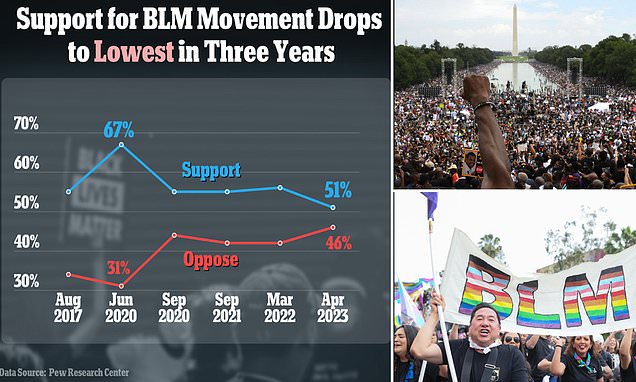
Support for scandal-plagued BLM falls to its LOWEST point since murder of George Floyd: Just 51% of Americans now say they back the movement compared to 67% in 2020
- Pew poll on Wednesday showed waning support for BLM movement in the US
- Just 51% of adults said they back BLM, down from 67% in the summer of 2020
- Last year BLM chapters sued BLM Global Network Foundation, claiming fraud
Support for the Black Lives Matter movement has dropped to its lowest level in the US since the police murder of George Floyd three years ago, according to a new poll.
The poll from Pew Research Center published on Wednesday found just 51 percent of adults support the BLM movement, down from a high of 67 percent in June 2020, when racial justice protests swept the nation.
The survey found that 67 percent of Americans, a strong majority, agree that black people are treated less fairly that white people when it comes to dealing with police.
However, 57 percent believe the increased focus on racial issues since 2020 has not led to changes that are improving the lives of black people, compared to just 40 percent who believe it has.
The waning support for BLM comes amid controversy within the movement, after a group of local BLM chapters sued the BLM Global Network Foundation last year alleging financial malfeasance and fraud.
Support for the Black Lives Matter movement has dropped to its lowest level in the US since the police murder of George Floyd three years ago, according to a new poll
Attendees hold Black Lives Matter sign at the 2023 LA Pride Parade in Hollywood
The BLM Global Network Foundation board has furiously denounced the allegations as ‘harmful, divisive, and false’ and both sides are awaiting a judge’s ruling in the suit.
BLM Grassroots, which represents the local chapters, and the BLM Global Network Foundation did not immediately respond to requests for comment on Wednesday evening.
The hashtag #BlackLivesMatter first appeared on Twitter in 2013, but the movement exploded in visibility, influence, and fundraising following Floyd’s murder by a Minneapolis police officer in May 2020.
In assessing the impact of the Black Lives Matter movement, just 32 percent say it’s been highly effective at bringing attention to racism against black people, according to the Pew survey.
Views of the Black Lives Matter movement vary dramatically by age, race and political affiliation, the poll found.
While 84 percent of Democrats and Democratic leaners support the movement, 82 percent of Republicans and Republican leaners oppose it.
Among white adults, just 42 percent support the movement, compared with 81 percent of black adults, 63 percent of Asians and 61 percent of Hispanics.
Broken down by age, 64 percent of young adults ages 18 to 29 support the movement, compared with 52 percent of those 30 to 49, 46 percent of those 50 to 64 and 41 percent of those 65 and older.
Pew conducted its nationally representative survey of 5,073 US adults between April 10 and 16.
A participant raises his first during the ‘Commitment March: Get Your Knee Off Our Necks’ protest against racism and police brutality on August 28, 2020, at the Lincoln Memorial
The decline in support for the controversy-ridden BLM Global Network Foundation has also been evident in a sharp decline in donations to the group.
Tax filings released last month showed the group raised just over $9 million in its last fiscal year, a steep decline from the $79 million it raked in the prior year.
A 60-page tax filing showed the foundation spent more money than it earned in its last fiscal year, from July 1, 2021 to June 30, 2022.
It ended the year with roughly $30 million in assets, down from the $42 million in assets reported in its filing the previous year.
The tax documents also show the foundation continued its business relationship with security contractor Paul Cullors, the brother of BLM co-founder Patrisse Cullors, who resigned as foundation director in 2021.
Patrisse Cullors resigned after it was revealed she had amassed a $3.2 million property portfolio, though she strenuously denied any wrongdoing.
Cullors did admit that the group was ill-prepared to handle the tsunami of donations that poured in as it shot to international prominence following Floyd’s murder.
BLMGNF directors D’Zhane Parker, left, Cicley Gay, center, and Shalomyah Bowers pose for a portrait in May 2022
Donations to the BLMGNF saw a shocking drop-off of nearly 90 percent from 2021 to 2022, as the group’s use of funds continued to cause controversy
The BLM nonprofit had raised more than $90 million in the first year following the wave of protests over police brutality in the summer of 2020.
But with the racial justice fundraising environment quickly returning to norms, the new tax filings show the organization cut operating expenses by nearly 55 percent last year.
Cicley Gay, board chair for the foundation, said the belt-tightening was part of an effort to demonstrate that its stewards ‘have been responsible, proactive decision-makers of the people’s donations.’
‘We are building an institution to fight white supremacy and reach black liberation,’ Gay said in a statement about the tax filings. ‘Every dollar we spend is in order to reach that goal.’
Source: Read Full Article




